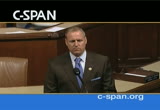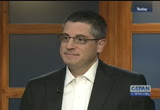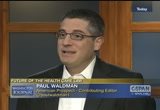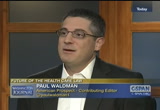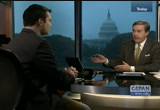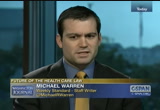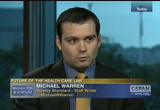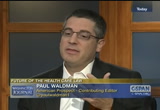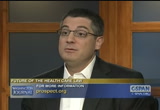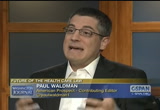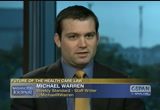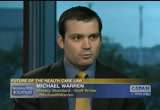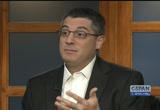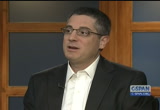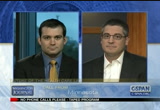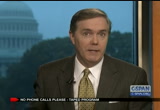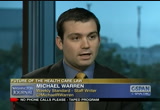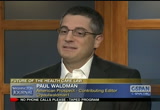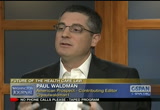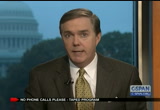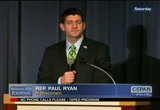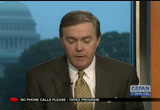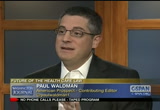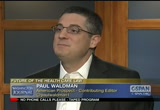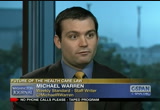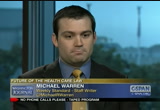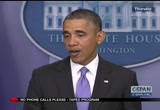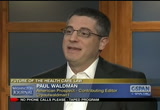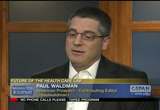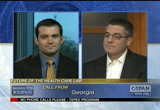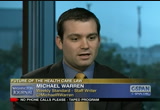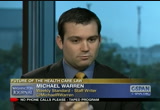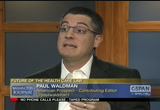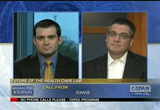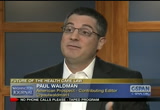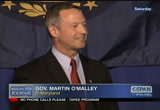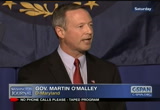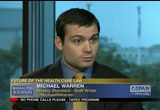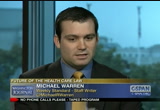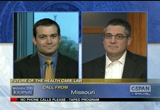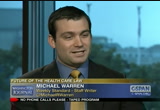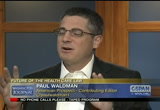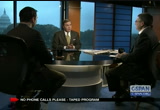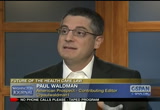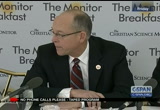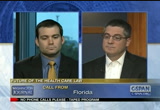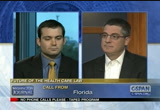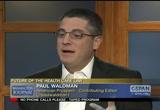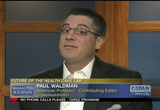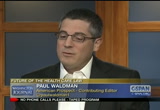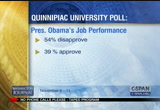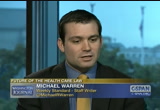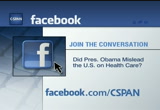tv Road to the White House CSPAN November 17, 2013 10:00pm-11:01pm EST
10:01 pm
>> on friday, the house passed a bill that would allow health insurance companies to sell health plans through 2014 that do not meet the minimum requirements under the health care law. that vote took place just a day after president obama proposed changes that would allow people who received cancellation notices to keep their plans for another year. next, a roundtable discussion from this morning's washington journal about the future of the health care law in light of the actions by congress and the president. >> two publications represented on the sunday roundtable. michael warren, the staff writer for "the weekly standard," and paul walden, thank you for being with us. i wanted to get with you because you have this memo to democratic chicken little, the sky is not falling. the headlines focusing on the beginning of the end when it
10:02 pm
comes to domestic agenda items. >> i think we have the tendency to believe -- whatever is happening right now is going to be that way forever. you might remember a couple of months ago people were saying that the fact that barack obama couldn't get a vote on his proposal to have the action against syria and his presidency was crippled. then we had the shutdown. people were saying the republicans were never going to win another election again. now people are saying that, you know, barack obama's presidency is over. the fact that it has three years left in it. people need to take a deep breath. yes, he certainly is a critically a poor moment for obama and the democrats. there's no question. there are a lot of problems that are coming out about the affordable care act. but it's a long time before the next congressional election, the next presidential election. there's a lot that's going to happen between now and then. but you kind of reverted to the way things have traditionally been, which is that democrats in congress tend to be fearful and
10:03 pm
ready to react instantly to any kind of momentary dip in the polls. that's why you saw the democrats in the house for the proposal to basically gut a good portion of the affordable care act. because they're under the missed impression, i think, that that will protect them if things don't go well. >> is it that or a re-election plan as sometimes referred to for the democrats. >> they're under the mistaken belief that somehow this vote was going to inoculate them if the affordable care act doesn't go well. keep in mind, the things they're talking about now. what people are going to get insurance on the exchanges, that all happened on january 31. this is in a great sense sort of the preseason. and you wouldn't say, well, the cowboys lost their first preseason game and therefore the whole preseason is a disaster. and i think that ultimately the law is going to work or it's not. and that will be the thing that
10:04 pm
determines the political effect, particularly on democrats. once those plans are in operation. once premiums are stabilizing, going up, going down, many people who have insurance that didn't have insurance, those are the things the practical success of the law that are going to determine if it was a good idea or not. not what happened with the website before things launched for good. >> you anticipated the ebb of the flow of the news cycle. after the train wreck, what would the republicans offer to replace obama care. the public outrage will grow. democrats will begin to affect some of them. but what is the alternative? democrats will say, okay, what's your plan? >> that's exactly right. that's the point of the piece that this is happening faster than anybody in washington and particularly republicans and
10:05 pm
congress ever expected. it's the point about what's going to happen. will the law stabilize -- will they stablize the premiums and will the law start to work? i don't think that's actually what's going to happen. republicans aren't anticipating that's what's going to happen. we're looking at 5% of the health insurance market as being affected directly by the implementation. but we haven't seen what happens, for instance, with small businesses when the shop program, that's the small business health option program or something to that effect goes into effect. it's effectively the market for small businesses. that's going to be another giant chunk of people who are going be thrown into this law who are going to come to higher premiums. and that's what you're seeing so many 39 democrats affected on the upton proposal. i think the president had not
10:06 pm
come out on thursday and made the administrative fix, you would have seen more democrats. you're talking maybe 60 or 70 democrats affected in the house on this. you still have the democrats in the senate for their own proposals. up from 2014 from louisiana. she had this proposal. she since pulled back since the administrative fix. but the difference here, i think, from the 2009, 2010 for the president is that back then, you had all sorts of public pressure against the health care law. you have the special election in 2010. everybody thought this was going to stop. and democrats held together. democrats pushed this through and made it law. you're not seeing that anymore. and i think in the last three years, the difference is president oh what doesn't have the public trust that he had in 2009 and 2010. he doesn't have that coalition that was able to push forward
10:07 pm
obama care through congress in 2010. it's just not there anymore. and people are looking beyond obama's presidency. >> i want to come back to the specifics of health care. but a question for both of you. because johnson had vietnam, nixon had watergate. reagan had iran contra, clinton had impeachment. you look at the second term presidents and a book written about second term curses, is this a key moment. is this compatible to what we've seen with past presidents in their second term s? >> the answer is you have to wait and see. there are three years left in his presidency. as i said before, there are lots of reasons to think that this thing is going to work out okay. this -- what started this was the problem with the website. that's disastrous for a lot of reasons we can talk about. but ultimately, they're going to fix it. that's a manageable practical
10:08 pm
problem. but if it's not fixed by the end of this month, then what? >> if that's not fixed? well, they will end up extending the open enrollment period to give people a couple of months to sign up. it's not like the sky is going to fall on december 1 if the website is not perfected. so there are ways to handle that, to extend it a little bit. and so the question then is over time as this thing gets rolled out, you know, what is it the overall effect, how do people think about it? for example, we've gotten very, very caught up in thinking about those people who are in the individual market who have gotten these cancellation notices from their insurers. that's a pretty small subset of the bob yue lags as a whole and people who are directly affected. the reason we haven't spent a lot of time going and interviewing people who say didn't have insurance but can get medicaid. those are lots of stories as well. perhaps they're told, maybe they won't be told. but in is a law that had a lot of practical effects on people
10:09 pm
at all levels, not just this sort of -- we kind of made these particular individuals who have these limited insurance plans that they want to keep and just as an aside, if you have one of those plans and you like it, it's probably because you never had to use it. i think that's another issue. we got focused on a small group of people. and frankly, the news media is fickle and they're going to start to lose interest in that story telling you the supposed horror stories of the people who are now going to have to get a different insurance plan. they'll start telling different stories. perhaps premiums will go up, maybe they won't. premiums had been increasing in the last couple of years but at the lowest rate in a long, long time. there are good news in the market, generally. those things in the coming couple of years is going to determine how we look at it. everything went to hell that was a real disaster.
10:10 pm
we may look at it as a time that we got excited we might work out fine the same way medicare part d did. >> is this a defining moment for the president? as you look at the arc oh it was last 50 years and the problems of the presidents based in this country, is it comparable? >> well, i think if you look at specifically obama care as sort of the enter piece for the obama presidency, right, president obama sort of represented a new type of liberalism, or a return to an older type of liberalism that had been jetsoned in the clinton years. that's a big liberalism. it says we can do big things with government and get things done. the problem has been for obama is that he admitted as much in the thursday press conference where he was talking about the website and talking about the troubles that -- that the difficulties of whether that comes with buying insurance. buying insurance is figuring out
10:11 pm
what's difficult. more so than any republican or commentator could make with a damning critique of his own vision of government, of his own vision for what his presidency was supposed to be like. but as paul said, yes, this could all go away. the news media might move on to other things and find stories interesting. i don't think it's going away. january 1, say that somebody goes to the doctor after january 1 and realizes, well, wait a second. they're not in my network. they were before, but because of the disruption of the insurance market, they haven't -- they ear no longer in my insurance -- i have to pay full price and no co-pay, we'll hear a slew of stories about people losing their dorks, even though they were told they could keep their doctors by the president and by democrats before november 15. if this mandate isn't eliminated, a lot more people will get the same type of letters as those in the
10:12 pm
individual insurance market are receiving now. >> staff writer for "the weekly standard" has been in publication for the last few years. a contributing editor for the american prospect. he's a graduate of swathmore college and earned his doctrine. mike takes aim at my question earlier saying this minor glitch saying this doesn't quite rank with the former president's missteps. we're backing out of war, for example. >> got a point? >> sure. >> keep in mind, there are millions of people who are going to be positively affected on january 1. you can run down the list of the obama administration often do. there will be millions of people who are getting medicaid or subsidies. people who had pre-existing conditions and couldn't get insurance. but then will be able to get insurance. there are a lot of positive stories they can tell too.
10:13 pm
and the question is whether or not those are positive stories which are in some cases life transforming are more important than the person who was on a very cheap plan that they kind of got cherry picked in that individual market and now has to get a plan that's more comprehensive and may cost a little more. is it that way in people's mind? a lot of it has to do with how the stories get told. it's true. any problem that anyone has with health care is going to get blamed on president obama. people are going to find themselves getting sick and some cases, even dying under obama care. and the reality is that that's going to end up getting blamed on him too. right now, we're talking about decisions that are insurers who make, private actors in a marketplace. those are all blamed on obama care. and that's something that the republicans are going to keep trying to do to encourage people
10:14 pm
to blame anything that goes wrong with the health care on the president. if you take on big reform, you take responsibility. >> i can't wait for the 2014 democratic blood bath. a beautiful thing to behold. america is awakening to the farce of socialism. paul joining us from international falls, minnesota on the democrats' line. good morning. >> good morning. >> good morning. i'm calling you because i am a democrat. i've been watching this thing from the start. let me say democrats are going on with the republicans. you're talking about blue dogs, 99% of them. they're democrats, but they're not. another thing about it, they lied about this health care since it started. i'm 75 years old.
10:15 pm
excuse me that i get excited here. this is good for the people who don't have insurance. i spent a lot of money and put the family in a lot of hurt because of not being able to afford insurance. and the insurance companies have been robbing us for years and years and years. they still are, they still have their foot in the door. so, please, get the damn thing straight and tell the truth about what's going onif 1.5% ofo change policy, big deal. host: and quit lying. if 1.5% of the people have to change policies, big deal? >> that's your point? thanks for calling. >> i think the caller raises a really good point about the fact that the insurance market wasn't a great thing before obama care. and republicans need to
10:16 pm
recognize that interest for political purposes but for also for good policy. if they're going to replace something or change something in the health insurance policy world, they need to recognize the fact that insurance companies aren't anyone's friend. anyone who dealt with an insurance company knows they can be frustrating and difficult. republicans and conservatives need to argue that obama care is the long fix for the problem that the caller mentioned is that people didn't have health insurance before. republicans, i think, in congress are getting this idea. they are understanding that it's not just sort of a peons to the free market. they have to actually come up with good policy proposals. that's happening, you know, you have a lot of folks at "the wall street journal" on thursday. they had a -- an op-ed arguing for conservative health care
10:17 pm
reform. something is changing here which is that -- and paul alluded to the fact that anything goes back with health care and health insurance in the next few years is going to be blamed on president oh what. that's a real opening, i this i, for republicans for whom health care has never been a really good issue for them. now they have an opportunity to make some strides. >> this is from our facebook page greg says this -- incompetence or misleading. what difference does it make with regard to health care? >> ultimately, what makes a difference is whether it works or not, not how you interpret a statement that he made. i want to have folks thinking about people writing in about socialism. most of the problems that the affordable care act is experiencing come from one of the first decisions that they made which was that instead of really radically overhauling the entire health care system, they were going to try to maintain
10:18 pm
the private character of it. all of the people getting cancellations and moving to new insurance, that's private insurance. to you have this incredibly complex system that comes out of the fact that it's basically capitalist in nature. you have a lot of different interests with ways to bring money out of the system. a lot of complexity. and so what the affordable care act did was it put another layer of complexity on top of all of that complexity. and if they had wanted to make it simple, they could have done something that was more socialistic. you know? we have a single payer health care system in america. it's called medicare. it happens to be the most popular of all of the options. people who are on it love it. much more efficient than private insurance. had they wanted to, they could have done something like that, could have been a more fundamental reorienting of the system. but instead, they decided it was politically impossible. so they put together a reform that would basically try to undo
10:19 pm
some of the worst abuses of the private system while maintaining the private character. that's part of the reason things are so complicated because they put a little more complexity on top of it to try to rein it in. it would have been a lot simpler if it had been socialism. >> we welcome our listeners. paul waldman of the american prospect and michael warren of "the weekly standard." we covered some early presidential politicings. we're on the air here in c-span. among the events in iowa, a fund raiser for the governor who's seeking another term, republican for iowa, among the speakers, congressman paul ryan, the 2012 vice presidential nominee. a perspective candidate in 2016. also the chair of the house budget committee. >> i don't know if you noticed this, but obama care has had a
10:20 pm
few hiccups lately. don't you remember, though, we were told we had to pass this bill in order to find out what was in it? well, here we are. i seem to recall tom, maybe you can jog my memory. as i recall, one of the guys who voted for this law was a guy named bruce brayley? you know who that is? look, this law is doing real harm to real people. this law is making people disrupt their lives. millions of people are getting cancellation notices. families are seeing their premiums go up. the crowd that brought us this website where they had three years to prepare, a half a billion dollars to spend, is the same crowd that is now poised to take over 16% of our economy of
10:21 pm
the health care sector. president obama, though, said he didn't know any of this stuff was going to happen. he said he had no idea these problems were in the offering. we had kathleen sebelius come to the committee and say everything was ready to go. here's the issue -- if you outlaw the kind of insurance that people actually have, they won't be able to keep those plans. they passed the law three years ago to outlaw the kind of insurance people have and they're surprised people don't have them? >> congressman paul ryan last night in iowa, altoona, iowa campaigning with the eye on the possibility of running in 2016. this is a headline for john thank wiseman of "the new york times," in the fracus on health
10:22 pm
coverage, some feel exposed. the reversal of political fortunes in the past month has been head spinning. republicans were contending with the voter fury over the 16-day shutdown. democrats had the momentum. now over obama care, republicans have found their voice. >> if you represent a conservative district as a democrat, you live your entire existence in fear. that gives people a narrow view of what's going on in the political world and what the future is like. you see those democrats, the democrats who voted for the republican proposal in the house, they tend to be by in large people who were from conservative districts or closely matched districts. and they're -- they have what i think is a misimpression that they kind of respond to every -- this week's news to try to do something to ward off an attack that they see coming when they envision the ad that's going to be aired against them in the next election, that's going to
10:23 pm
be what makes the difference. and, you know, most people who have that narrow view end up losing anyway. that's what happened to a lot of the democrats who voted against the affordable care act when it was pass in 2010. there was a wave election in 2010. it didn't matter whether they voted for or against it. if they were in one of the districts, swing district or conservative district in the election, they lost. their vote didn't bro tekt them. and i think that's true now. what matters to -- to those democrats really in next year's election is whether or not the law is it going to go well. and they may have -- they may wake up at night dreaming of some attack ad that's going to talk about the next vote they take, but the broad success of the law is going to make a lot more difference to them. but the reality is those people from those districts are in constant terror. they dictate those actions. >> along those lines, this is a tweet directly related to what you write about in ""the weekly
10:24 pm
standard"", which is republicans, you need to wake up about something, if obama care fails, we'll be going forward to single payer, not back to co-insurance dominance. that's what you wrote about, after the train wreck, what will republicans offer. >> i think paul is right. i think he articulates what i hope liberals in congress might have been a little more honest about in the obama care debate, it would make more sense to have a single payer health care system if you make a liberal reform of health insurance. but republicans, i think, if there was a vacuum in terms of policy, in terms of leadership on health care, in the policy realm, then -- then republicans are really ceding some ground they never really dominated on before. it's interesting that since barack obama was elected, there's been two major elections on which republicans have won. the first was the scott brown win in massachusetts and the special election.
10:25 pm
a lot of national attention to that money. and the center -- at the center of that race was obama care. hasn't passed yet. but scott brown was supposed to be the senator who could stop it. and then the 2010 election, republicans won and the wave in the house made some gains in the senate but weren't able to win some of the key races. and think about what republicans have lost since president obama was first elected in 2008. 2012, mitt romney lost that election. he explicitly did not run against obama care. did not run on health care. he was trying to get away from his record with romney care in massachusetts. so i think that republicans are looking at this from a political perspective, they've got to see -- they've got to see victory and criticizing obama care in going after and being aggressive on health care. but that's also going to require a plan of their own. something that there's a lot of things in the house, a few in the senate, that the republicans are throwing out there, good
10:26 pm
ideas, i think. but we need to have some leadership. somebody to sort of take all of these ideas and say here's a republican vision for what health care should look like. it doesn't look like the old system. and it certainly doesn't look like obama care. and we may be seeing this health care debate stretch on for the next two, three, four, five years. >> michael warren with "the weekly standard" and paul walden with the american prospect. he brought up the point earlier that the 39 democratic votes in the house could have been 60 or higher. here's how the president framed that in the statement to reporters on thursday. >> the american people -- those who got cancellation notice do deserve and have received an apology from me. what they want is words but they want to make sure they are in a better place and we meet that commitment. by the way, it's very important for me to note that there's a whole bunch of folks up in congress and others who made
10:27 pm
this statement and they were entire lisin sere about it. and the fact that you've got this -- this percentage of people who had this, you know, impact. i want them to know that, you know, their senator or congressman -- they were making representations based on what i told them and what this white house and our -- and the administrative staff told them. it's not on them, it's on us and we intend to fix it. >> where does this put the president? >> he was trialing to be as candid as he could and tell people to use the expression, that he feels their pain. and there were a lot of things that he said in that press conference that i think were useful to have a discussion if
10:28 pm
people watched it. the reality is most people weren't tuning in in the middle of the day to watch the president's press conference. they probably saw a snippet on the news later on. but he talked about what michael raised before about the fact that the existing health care market is not particularly a friendly one for people. and that we can't go back to that. and so he -- i think he said what he could. and in the end, i think what are we going to remember about this six months from now? it's that all of the things that actually went wrong and he came out and told people he cared and tried to come up with a fix. we'll see if that fix makes much of a difference. the real problem they had was these two things happened simultaneously. that it wasn't just that insurance companies were telling people that we're going to cancel your policy. by the way, we want to sell you something more expensive. when people got the notices, if the federal website had been working really well, they could have just gone and seen, oh,
10:29 pm
well, there's three other options that i have and there's one that looks terrific. but the federal website wasn't working well. they weren't able to do that. there are some that are working great. in california, in 30 seconds you can find out what you would pay if you happen to be lucky enough to live in california. but because people didn't have that opportunity, that enabled this sort of rising panic. then the media did the stories of people without asking whether or not they could find better coverage. so, you know, i think that he did what he could. and it was important for him to communicate to people that he understands what's going on and he wants to fix it. at this point, that's all he can do. the real question is getting it fixed. >> baby-boomers getting old. never going to hear the end of health care arguments. i saw a statement here. 10,000 baby-boomers retiring every day. edward in douglasville, georgia. live from democrats, paul walden, the american prospect
10:30 pm
magazine, michael warren of "the weekly standard." go ahead, ed? >> good morning, first. i would like to say this -- this -- this depresses me that you're not getting to the root of the problem. that is the lobbyists. this is all about money. and the lobbyists have pushed bills through that is in the corner of the insurance companies for years. and, you know, i -- in 2014, i'm going to vote in the republican party for the primary. in the general election, i'm going to vote democratic. the nuts pushing for more money is brewing in this country. the people don't have a say. it's about how much money gets pumped into the congressman's purse. how is it that their salary is so minimal, yet still just about every congressman is a millionaire? i mean, something is going wrong
10:31 pm
here. and we need some caps on how much money these senators and congressmen and house of representatives people are getting. >> we'll get a response. >> you know, this is a problem, i think, that the caller mentioned for -- he sort of directed his ire toward republicans. this is a problem for democrats too. particular approximately wh-- particularly when this law, obama care was passed. he talked about the lobbyists, the money that floats to people's pocketings. not always a check written directly to congressman x. think of the backhand deal to get ben nelson to jump onboard. that's going to sort of carve out the health care waivers for nebraska. so money has always been a problem in politics. that's nothing new.
10:32 pm
be worth the republicans waking up to the fact that the caller's opinion about washington is something intensify in the last few years. if 2010 was an anti-incumbent, anti-washington election, 2014 could be gearing up to be the same. that's not all good news for republicans. >> so to your earlier point, from dee dee fredericks, do we know the cost to taxpayers for the affordable care subsidy s? >> we don't. it's interesting that the numbers came out from the health and human services department, i think it was about 106,000 people had signed up through the federal exchange, through the various state exchanges. and signing up for health insurance. more than double for signing up for medicaid which is the -- basically the poor and infirmed health insurance for them. i think one of the miscalculations that the democrats and the obama administration made was that
10:33 pm
when people got on the exchanges, they wouldn't be signing up for private health insurance in a highly regulated market. they would be signing up for more transfer payments. as you mentioned at the top of the segment about the number of baby-boomers that are going to be retiring, the welfare state in this country is basically being bankrupt by skyrocketing costs. and so adding to those -- those roles going to be problematic just through the financial and fiscal health of the country. >> this e-mail and a comment from our face book page. first from a viewer in miami who says i find it amazing that the insurance companies get no blame for selling junk policies. bush and cheney got no blame for lying about iraq. but obama gets blamed for taking care of citizens. society is really pathetic. facebook page steve conner. how much should the gop and tea
10:34 pm
party misled us on their lives that the old system is better. the health care ranking around the world from other countries, ask those questions, please. >> it's true. frank frankly, if i have to redesign the system from scratch, maybe michael is right. maybe they get a chance to fail, we'll get that. the hybrid system with a single payer plan that covers everyone in a misic level. but most people buy supplemental private insurance to let you buy all of the insurance you want. that's not too different from what medicare patients have now with policies. the influence of money, one of the positions they made, they spent a lot of time looking at what happened with the clinton reform in 1990. they felt it fell apart because they had all of the interests who have a lot of money like the insurance companies. that i made a decision to try to co-op all of those people. get the insurance company,
10:35 pm
doctors, the hospitals, the device makers, and all of the people who have a big interest in continuing to make money in the health care system. they're going to try to bring them in instead of having fight them. it worked to a great extent. one of the consequences of that is that you're still maintaining the ability for all of the people to make a lot of money out of the health care system. that means that you solved some problems and create others. >> joe joining us from cedar rapids, iowa, republican line. good morning, welcome to the program. >> hello. i recently retired from a large corporation i worked for for 40 years. anyway, my main point was on the bronze plans, the 60-40, the 70-30, the 80-20, and a 90-10. but they had all of the
10:36 pm
mandatory requirements of anybody who buys a bronze or silver plan could easily be bankrupt i under those plans just because the coverage is so bad on major medical and stuff like that. wouldn't it be better to have the bottom three 80-20s, the bottom one a major medical co-pay on emergency room? drug card, second one would be a little better. and then the last two could be whatever you got now. >> okay, joe. thank you for the call. who'd like to take that? >> i can answer -- the short answer is it would be more expensive. the more cost sharing you have, the cheaper your plan can be. they designed it -- the goal would be that nobody could be bankrupt because there's limit on your out of pocket spending. it may not be something you want to pay, a few thousand dollars or whatever it is. and hopefully that will prevent
10:37 pm
anyone from going bankrupt if they have a bronze and a major medical event like an illness or a disease. but there are going to be tradeoffs. it would be nice if everybody could get health care and never have to pay for it. but the more you want to save in the system as a whole, the more you have to have people chip in some of their own. but also we talked about the welfare state and the expansion of this. there's some things worth spending money on. when someone gets medicaid, a lot of conservatives feel like that's a bad thing because it increases the size of the welfare state. have time to look at that and say, well, that's a good thing. now a family has health coverage. in texas, rick perry, 1.4 million people who could benefit from the expansion of medicaid but he refuses it, he thinks it's a bad thing when somebody gets insurance through the government. people like me like that say there's 1.4 million people who could have health coverage. that would be a good thing for
10:38 pm
your state and for them. but it's a fundamental difference of how you look at what kind of value you get out of that spending. we spend money on health care. we're not just flushing it down the toilet, we get to improve people's lives. >> let me get your reaction to another point last night. another potential candidate, the democratic governor of maryland who was in new hampshire for a fund raiser for the jefferson jackson day dinner. he talked about the tea party. a portion of what governor o'malley had to say. >> i know -- i know people like mitch mcconnell and kelly ayot -- i know that they've been trying to distance themselves from the tea party every since they nearly drove our country into default. but the truth is, sadly, there's very little difference today between the tea party and so-called main stream republicans.
10:39 pm
ask sheryl kay porter, ask annie custer. they see it every day in the unrepresentative house of representatives. there's little daylight between the tea party and the republican party. think about it. both would have millionaires do less -- cut taxes for big oil, cut taxes for multinationals, reduce social security benefits and medicaid coverage. cut student loans, cut veterans' benefits, invest less in education, in affordable college. do less to combat climate change. do less on gun safety. do nothing to fix our immigration system. and keep families who are trying to survive on the minimum wage from ever earning even another penny. it would appear that the only thing they want more of is rush limbaugh.
10:40 pm
>> well, michael warren? the argument from the democrats. >> i thought it was interesting they mentioned carol shea porter who voted with all of the tea party nut cases in the house for the upton bill on friday. i think he's right that there's a lot less difference between the so-called main stream republicans and the tea party. that's probably to the tea party's credit. the tea party movement has moved into the republican party and moved that party to the right. >> let's talk what about he said specifically about bringing us over the cliff with the government shutdown earlier this fall. ted cruz, one of the tea party senators from the 2012 election, sort of the ring leader of that. look, on tactics, i think ted cruz was probably wrong. i think he misled a lot of conservatives, a lot of tea partiers in thinking they could buy shutting down the government or threatening the shutdown,
10:41 pm
they could defund obama care. the fact that he was fighting what was coming with obama care with all of the cancellation, all of the people upset about their coverage getting worse and losing their doctors and their providers. so with the tea party is fighting the fights that a lot of americans agree with it. they don't agree with the tea party necessarily. the tea party has been portrayed sometimes to their own credit, as sort of a right-wing faction that is outside of the main stream. but particularly on issues like obama care and government involvement in the health care system, they're the main stream people of the american people. and i think democrats like martin o'malley probably -- it's good politics for them in a democratic primary to knock the tea party. but the -- they're probably making a mistake. >> if you want to watch the
10:42 pm
speech by governor o'malley. you can see it at our c-span library, check it out, c-span.org. kelly ayotte is main stream and that should tell you how far right the tea party has moved. jim, springfield, mississippi. independent line, paul waldman. >> it's springfield, missouri, just the place you media people on main stream -- i'm one of two that continues to get a springfield news leader. so think about that down the road. you're drinking too much kool-aid, some of you. how do you think anyone in the federal government can run a health care program when 1500 irs refunds go to one house in atlanta, $4 billion go to two houses. one of them in russia? and one of them in shanghai? my god, folks.
10:43 pm
do you ever talk -- we never fix anything. we just keep going. well, keep going, tea party. have a good day, gentlemen. >> okay. who would like to respond? >> i do want to point that the caller raised -- i thought about during that presidential press conference on thursday that president oh what was talking about how difficult and complex the whole process of getting folks insurance through the website and he made a statement i heard from some of his surrogates, never heard him say that directly, which was that a crafting the website, crafting the whole federal exchange, because of rules in the federal government, they weren't able to get the contractors at the right rate. but they say they were able to get in the 2012 presidential campaign in the private sector. i think that -- in many ways sort of undermined the whole technocratic liberalism that
10:44 pm
barack obama represents. the caller is right. this is -- this is a miscalculation among democrats and liberals that the government can famously restructure the health care system without there being any losers involved. there are losers. that's what we're hearing from. >> this is the most important part of this story. especially about the website. we had an explosion in the government contract in the last few years. when george bush came to office, it was $200 billion a year, when he left, it was $500 billion a year. the mistake on the website is they thought you could run it like any other big government contract, like they do when they build the bomber. you spread the money around to lots of different subcontract subcontractors. budgets get blown through, deadlines are missed. things take longer than they thought they were going to, it takes years longer than it should have. the healthcare.gov website ran like most big contracts do.
10:45 pm
i.t. contracts and military contracts. if they had a lot of foresight, they would have said that's not going to work and we need to find a way to circumvent that system. so they have these companies like cgi are in the business of getting a federal contract not in the business of creating i.t. projects. they know how to pull the money out of the government. general dynamics like lockheed martin, they had big divisions too. it was inevitable that they run into these kinds of problems. that's what every big government does with outside contractors. had they been smart, they would have said we'll find a way around that so this doesn't end up happening. >> this may be impossible to answer. if you can take your politics out of the health care debate. and if the affordable care act in the present form does not work, then what? >> well, i think it's a policy answer if there is one. >> what part of it doesn't work.
10:46 pm
folks are one thing at a time. focused on the people who are in the individual market. but -- >> the mandate delayed by a year anyhow. >> going to be talking about that in a year. a lot of reform for instance to medicare payments that are meant to encourage cost savingings by not piling up the procedures on people. there are things that can work and bring down costs really well. or they will not. there's all of the pieces that to a certain extent, this is our one chance. once in a generation, we have to fix health care. we have to fix everything we can think of. what's likely to happen, some of the pieces are going to work better than others. once you have this law, and this is what conservatives including ted cruz that have raised. once you put it in place and it's all implemented, it's difficult to get benefits way from people. you pay for subsidies to get health insurance. a lot of it is hard to take
10:47 pm
away. a lot of it will be built into the system. so then if parts of it don't work, then you're going to have to address them piecemeal. once january 1 comes, the idea of repeal ohhing bama care is going to be off of the table. >> greg waldman is head of the congressional campaign committee. he participated now open to c-span cameras now open to the environment for democrat kralts and rep pubs and what he says will happen in 2014. >> now it has become a category five political hurricane that is not just causing havoc in certain regions of the country. it is ripping apart every region of the country in tiny hamlets and towns and major cities where people are finding confusion,
10:48 pm
chaos, cancellation, cost increases. all of which were predicted as if you had noaa reporting that the storm was coming four years ago. and the administration and the democrats in the house were in denial, they misled, and they did nothing to prevent what is now unfolding. so i think 2014 is going to be a referendum on the failures of this administration and this notion and philosophy that big government has the answers. big government can do things better. and americans now fully appreciate and understand that that's not the best approach. >> congressman greg waldman, friday, at a christian science monitor breakfast, he's the chair of the campaign committee. from oregon.
10:49 pm
independent line, good morning? >> good morning. i guess i want to start with the money or whatever. we've had -- everyones had health care for i guess the last 30 years because you can go to the emergency room, which is an unfunded federal mandate and you have to be treated. medicaid, there's like a three-to-one ratio of the states that are up and operating with people going on medicaid and, of course, jay carney astounded me the other day when he stood up in the press release and said medicaid's for free. i don't guess there's a budget item for that. and medicaid is going to be paid for by the federal government for the first three years. well, the states i live in, florida, say our medicare budget is more than our education budget, which is a favor to the
10:50 pm
democrats. where is the money going to come from to pay the new medicaid benefits and i heard the other day that the subsidies are going to cost like $1 trillion. that means next month, january 15, whatever it is, when the debt ceiling is reached, you have to add $2 trillion to the debt ceiling to pay for the subsidies which you don't have to report your income or verify your income. i guess, you know, it's astounding to me. it was brought up a few minutes ago about the working out the problems. well, we've had medicare fraud since the '70s. we're running $50 billion or $60 billion a year in medicaid and medicare fraud now. the government isn't doing anything about that. we -- >> can i say a second -- you bring up an interesting point. i want to follow up in case you're interested as well. there's a story this morning in "the new york times" on your point.
10:51 pm
the head line focusing on tennessee republican government. he's hesitant to expand medicaid. according to the national conference of state legislatures, 21 states, all of them either with republican governors or republican dominated legislators would not extend medicaid. district of columbia have approved an expansion. indicated they will do so. virginia expected to be next because of the newly elected democratic governor. what's your reaction. >> most of the things he said specifically were false. we don't have time to go through them all. it's not $15 trillion. it was paid for -- the affordable care act paid for itself in the original bill. maybe costs will increase over time. we don't really know. but, yeah, this is one of the things that we decide we want to spend money on. and the federal government for those states that are taking medicaid money, 100% of the costs of the new enrollees in
10:52 pm
the first year and then it ratchets down to 30%. they're getting a great deal out of this. they're getting $10 of health coverage for their poor citizens for $1. every study done by the independent groups, the rand corporation says it saves them money because they don't have all of that uncompensated care in going to the emergency room. that has to get paid for by somebody. that's more expensive than that person having a regular doctor to go for a preventive care visit for. not having those people covered not only costs the state money in uncompensated care, but it means a less healthy workforce, a less productive workforce. you have all of the republican governors who have decided they're not going to take all of this money that the federal government is offering them and improve quality of life in their state for reasons other than spite. they're talking about the concern about the budget
10:53 pm
question and maybe to a certain extent, they are. but that's really what it is. you know, to bring back something we talked about before about republicans needing ideas on health care. this, to be frank, is not an issue that conservatives care a lot about. they're conservatives who spend their life thinking about taxes, they care about it. they come up with ideas, plans, think tanks. health care is something that they haven't been a thing they're really concerned about. they don't have all of those plans lying around that have been well developed. the one big plan was something that came out of the heritage foundation. it became romney care then obama care. then the state is depression and turned against it. but, you know, i think that the -- when it was begun, the supreme court said that states could reject the medicaid extension, a lot of people predicted that, but the money would be too enticing. a couple oh things aren't true.
10:54 pm
ohio, schneider in michigan. republican governors decided to take it. maybe more will come on. but it looks like there will be a lot of people, maybe millions of people, who could get coverage. but aren't because the state governments have decided they don't want to have anything to do with obama care. >> are we acting like health care insurance hasn't always increased on a yearly basis, question mark? these numbers, we talked about them earlier in the program. the president's job of approval rating below 40%. 54% according to the quinn bee yak university poll disapproved. 49% approved. we should point out the survey it had an error of less than 2%. and on the affordable care act, did the president knowingly deceive you, 33% said yes. 43% saying it will get worse.
10:55 pm
43% saying lit not affect their health care. >> these are problematic numbers for the president. even if the policies aren't that popular, he's having to squeeze and to try to put things through congress to get them past so he can find them, he's been popular. he's had the trust of the american people. that has changed. whether or not he actually knew that this entire thing -- this entire website was going to be a disaster or what have you, the -- the fact is that he's perceived as having been negligent to take care of -- this is his -- this is the signature domestic achievement. and it's not been a good rollout for it. so i think he's -- he lost that public trust that was so important for him to get anything done in washington. he's pretty much a lame duck, i would say, unless something
10:56 pm
drastically changes which always could. there's always the beginning of our time here that the politics can change really quickly. but it looks like he's going to have a more difficult time than he's ever had in his presidency of doing something. it's about that trust. >> michael warren of "the weekly standard" and paul waldman of american prospects. thank you for being with us on this sunday morning. we appreciate it. >> thank you. >> the conversation on the health care law continues on the facebook page. the most recent question. did president obama mislead the u.s. on health care. you can post your comment and reply to what other people are saying on the issue at facebook.com/c-span. on the next "washington journal," fixing the
10:57 pm
healthcare.gov website. and kyle chaney of politico. a look at what types of federal assistance gets sent to the deceased because of inaccurate records of the social security administration. we're joined by david farenthal of "the washington post." live at 7:00 a.m. eastern on c-span. >> information that facebook has over 1 billion people. your political preference, your sexual preference, what you like, what your dog's name is, all these sorts of things. one security analyst said if the government had asked you directly for that sort of information, it would take you money, lawyer, maybe even guns to cough up the information. we routinely do so on social
10:58 pm
networks. we also don't think about the fact that our google searches are tracked. so i write mystery bookings. i looked on the white house for one. my google search ifs the fbi chose to look at them would be incriminating. i'm looking at different date rape drugs, things like that, for my mysteries. so people may sitting there with their computer think they're engaged in some activity not knowing if there's a big eyeball on the other end keeping track of the things that you do. >> i know who you are and i saw what you did 8:00 p.m. eastern on c-span 2. every weekend since 1998, book tv has brought you the top nonfiction offers including hanna rosen. >> women's identities are tied up in their work in a way they may not like. like what we might find disturbing and unnatural.
10:59 pm
it's not true. when i look at marissa mary, chosen to be the ceo of yahoo! when she was visibly pregnant and asked how much maternity leave you want to take, she said basically none. the fact that such women exists, it's not the way i would do -- i took plenty of maternity leave and -- but i -- i feel like that is a growing number -- you know, that is a kind of a woman that there can be space for. and the fact that there are some stay at home dads that are happy stay at home dads that don't entirely live in portland, oregon, that's okay too. >> we're the only national television network devoted exclusively to nonfiction bookings. throughout the fall, we're marking 15 years of book tv on c-span 2. >> in a few moments, q&a with historian and author doris kearns goodwin. after that, david cameron speaking at the annual lord's
11:00 pm
banquet this past week. a discussion of the priorities and challenges as the military alliance prepares for a meeting a year from now in britain. >> this week on q&a, author and historian doris kearns goodwin discusses her latest historical narrative entitled, "the bully pulpit." >> your new book, "the bullypulpit," theodore roosevelt, william howard taft and the golden age, you flip it over, there's a whole other story on the bike. i want you to start off with who's this man right here? >> the founder of the magazine, one
121 Views
IN COLLECTIONS
CSPAN Television Archive
Television Archive  Television Archive News Search Service
Television Archive News Search Service 
Uploaded by TV Archive on

 Live Music Archive
Live Music Archive Librivox Free Audio
Librivox Free Audio Metropolitan Museum
Metropolitan Museum Cleveland Museum of Art
Cleveland Museum of Art Internet Arcade
Internet Arcade Console Living Room
Console Living Room Books to Borrow
Books to Borrow Open Library
Open Library TV News
TV News Understanding 9/11
Understanding 9/11
